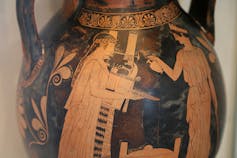A new body suit to control period pain is in the pipeline – and it’s called Artemis. Named after the Greek goddess of chastity, hunting, childbirth and the moon, it works by combining a tens machine (which provides pain relief through the use of a mild electrical current) and heat panels.
If it proves effective, it could be a huge benefit to women who suffer particularly with period pain – which is now acknowledged to sometimes be as painful as a heart attack.
There’s a long history in our society of period pain being played down, or just considered “normal” – with so much of history written by men who wouldn’t have understood – alongside the use of euphemisms to avoid even discussing it. But there’s also plenty of evidence on the historical record showing how coping with severe menstrual pain has always been a struggle for some women.
From our partners:
In her 2015 book Maids, Wives, Widows: Exploring Early Modern Woman’s Lives 1540-1714, historian Sara Read notes a passage in a medical text from the 1600s – the first anatomy text to be written in English – that compares having a period to childbirth.
In Microcosmographia. A Description of the Body of Man London physician Helkiah Crooke physician, discusses “the courses” – a term for menstruation. He writes:
Between the kidneys and the womb, the consent is evident in the torments and pains in the loins which women and maids have in or about the time of their courses. In so much as some have told me they had at least bear a child as endure that pain; and myself have seen some to my thinking by their deportment; in as great extremity in the one as in the other.
Artemis the great
The connection between the pain of having a baby and having a period is very appropriate to a product named after Artemis, the ancient Greek goddess associated with both. Artemis was the goddess that was turned to during times of transition, such as menstruation, development, and marriage.
A virgin goddess – one of three, the others being Athena and Hestia – she was involved as girls reached womanhood, with dedications made to her. These included your childhood toys and, before your sexual initiation, your belt. Indeed, women would dedicate their finest clothing to Artemis when their menstrual periods began.
Young Athenian girls who had not yet been through puberty were sent to an early sacred site, the sanctuary of Artemis at Brauron (about 30 miles from Athens), to serve at the shrine of the goddess. Records show gifts given in thanks, possibly for surviving childbirth, another transition in women’s lives involving blood.
Goddesses sell products
From the mid-20th century onwards, it has been popular to name women’s products after famous women and goddesses from the ancient Mediterranean. For example, the name of a company developing a modern treatment for breast cancer, Atossa, dates back to around 520BC.
It was the name of a Persian queen, who – according to the historian Herodotus – was troubled by a lump in her breast, which was treated by the Greek doctor Democedes. In his famous Histories – an account of the period up to the Persian Wars – Herodotus writes that:
A short time after this, something else occurred; there was a swelling on the breast of Atossa, the daughter of Cyrus and wife of Darius, which broke and spread further. As long as it was small, she hid it out of shame and told no one; but when it got bad, she sent for Democedes and showed it to him. He said he would cure her, but made her swear that she would repay him by granting whatever he asked of her, and said that he would ask nothing shameful.
Some scholars have read this as the first recorded instance of breast cancer, but this isn’t clear from this brief description. Nor is the nature of Democedes’ treatment. But we do know that Atossa was cured.
Australian company Atossa Therapeutics is running trials of hormone therapy in patients with invasive breast cancer who are about to have a mastectomy or lumpectomy. As of January 2023, the results were looking encouraging and trials have moved to the next stage.
The power of the classics
An early version of the contraceptive pill, marketed as Enovid, used the mythical Ethiopian princess Andromeda in its advertising. The story runs that after her parents went too far in boasting about her exceptional beauty, the angry gods had Andromeda tied to a rock at the mercy of a sea monster, but she was saved by the hero Perseus, who then took her as his queen.
For the manufacturers of Enovid, using their drug meant that every woman could “free herself from the chains” of worrying about unwanted pregnancy.
So the solution to women’s health problems is often presented in terms of ancient Greek female figures. Using these names may support the idea of continuity across history in how women have experienced their bodies, playing down how changes in society have affected them.

It also shows the lasting power of the classics, even at a time when few people learn about ancient Mediterranean cultures. And at the same time, it promotes a story in which “now” we can cure anything – even conditions that have been part of women’s lives for millennia.
By Helen King
Source The Conversation
For enquiries, product placements, sponsorships, and collaborations, connect with us at hello@zedista.com. We'd love to hear from you!
Our humans need coffee too! Your support is highly appreciated, thank you!

